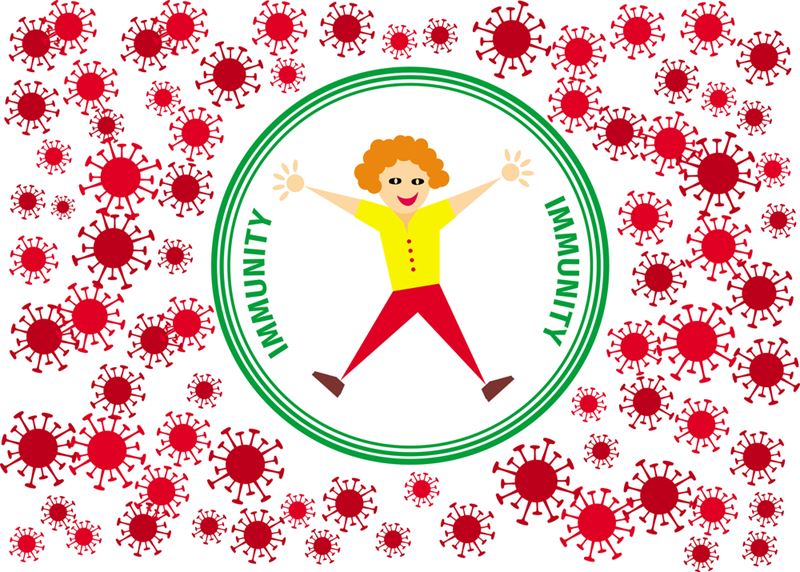 Source: bing.com
Source: bing.comAs a new parent, you might wonder how your baby develops immunity to fight off infections and diseases. Babies have a developing immune system that needs to be stimulated to work effectively. But can a baby develop immunity without getting sick? Let’s explore this question.
Table of Contents
What is immunity?
Immunity is the ability of the body to fight off infections and diseases. It is a complex system that involves different types of immune cells and molecules that work together to protect the body from harmful pathogens such as bacteria, viruses, and fungi. Immunity can be acquired naturally, through exposure to infectious agents, or artificially, through vaccination.
How do babies develop immunity?
Babies are born with some degree of immunity passed on from their mother through the placenta during pregnancy and through breast milk after birth. This immunity is called passive immunity, and it helps protect the baby from certain infections during the first few months of life. However, passive immunity is temporary and starts to decline after a few weeks or months. To develop long-lasting immunity, babies need to build their own active immunity.
Active immunity is acquired through exposure to infectious agents, either through getting sick or through vaccination. When a baby is exposed to a pathogen, their immune system responds by producing specific antibodies that recognize and neutralize the pathogen. This process takes time, and during this time, the baby may get sick. However, once the immune system has produced enough antibodies, the baby becomes immune to that particular pathogen, and the risk of getting sick again is reduced.
Can a baby develop immunity without getting sick?
Yes, a baby can develop immunity without getting sick through vaccination. Vaccines contain weakened or inactivated forms of pathogens that stimulate the immune system to produce antibodies without causing the disease. This way, the baby can develop immunity to a particular pathogen without getting sick.
Vaccination is a safe and effective way to protect babies from many infectious diseases, including measles, mumps, rubella, polio, and whooping cough. Vaccines are recommended by pediatricians and public health officials as part of the routine immunization schedule for babies and young children. By following the recommended schedule, parents can ensure their baby is protected from a wide range of infectious diseases.
What are the benefits of developing immunity?
Developing immunity is essential for babies to stay healthy and protect themselves from infectious diseases. Babies with strong immune systems are less likely to get sick or experience severe symptoms if they do get sick. They are also less likely to spread infections to others, including family members, friends, and caregivers. By developing immunity, babies can enjoy a better quality of life, free from the burden of infectious diseases.
Conclusion
In conclusion, babies can develop immunity without getting sick through vaccination. Vaccines are a safe and effective way to protect babies from many infectious diseases and are recommended by pediatricians and public health officials. By following the recommended immunization schedule, parents can ensure their baby is protected from a wide range of infectious diseases and can enjoy a better quality of life.
If you have any questions or concerns about your baby’s immunity or vaccination, talk to your pediatrician.
Frequently Asked Questions
Q: Can a baby develop immunity without getting sick?
A: Yes, a baby can develop immunity without getting sick through vaccination. Vaccines contain weakened or inactivated forms of pathogens that stimulate the immune system to produce antibodies without causing the disease.
Q: How do babies develop immunity?
A: Babies develop immunity through exposure to infectious agents, either through getting sick or through vaccination. When a baby is exposed to a pathogen, their immune system responds by producing specific antibodies that recognize and neutralize the pathogen, leading to immunity.
Q: What are the benefits of developing immunity?
A: Developing immunity is essential for babies to stay healthy and protect themselves from infectious diseases. Babies with strong immune systems are less likely to get sick or experience severe symptoms if they do get sick, and they are less likely to spread infections to others.
Q: Is vaccination safe for babies?
A: Yes, vaccination is safe for babies. Vaccines go through extensive testing and are carefully monitored for safety by regulatory agencies. Serious side effects from vaccines are rare, and the benefits of vaccination far outweigh the risks.
Q: What can I do to protect my baby from infectious diseases?
A: You can protect your baby from infectious diseases by following the recommended immunization schedule, practicing good hygiene, and avoiding contact with sick people. Make sure your baby gets plenty of rest, eats a healthy diet, and receives regular check-ups from their pediatrician.
